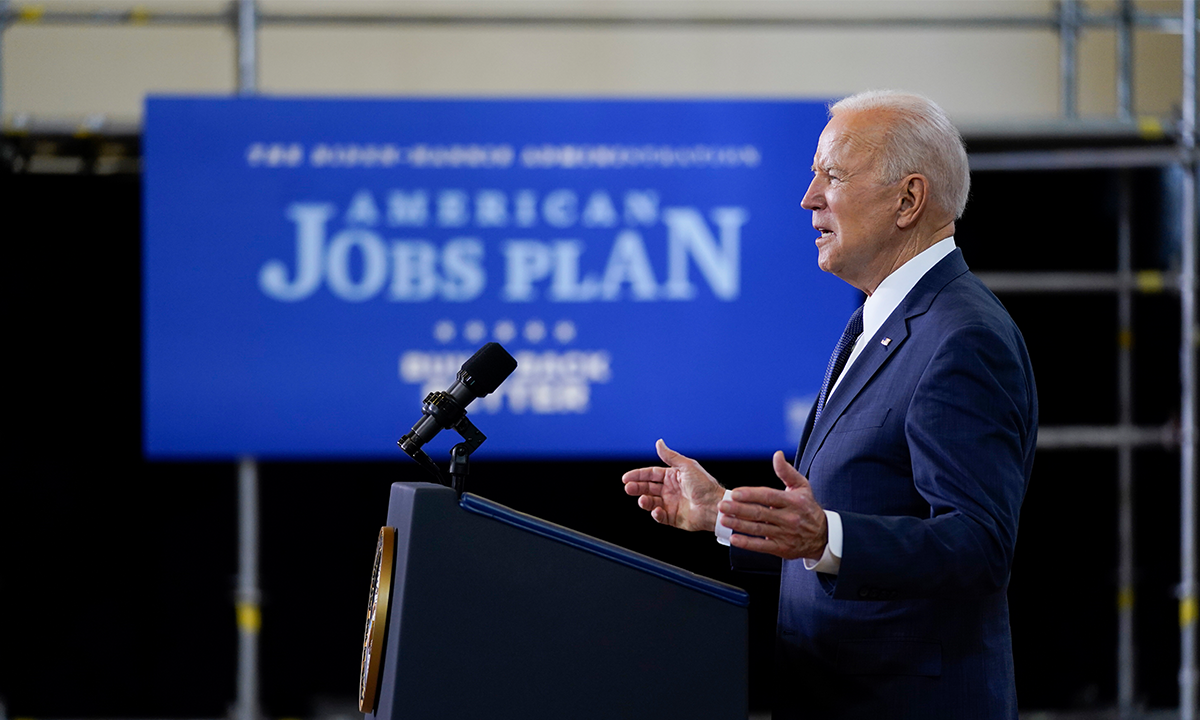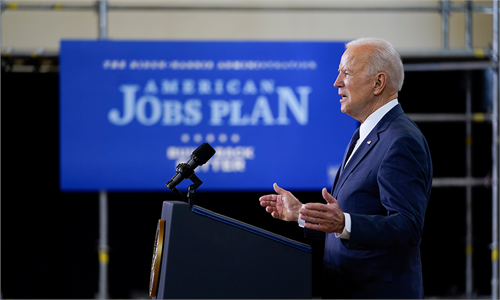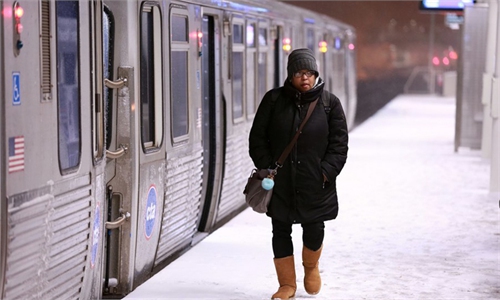
US President Joe Biden delivers a speech on a $2 trillion infrastructure spending at Carpenters Pittsburgh Training Center on Wednesday in Pittsburgh. Photo: VCG
As he approaches his first 100 days in office, US President Joe Biden is trying to achieve something significant about the nation's long-stalled infrastructure problems. The White House rolled out a $2.3 trillion plan to rebuild the nation's infrastructure at the end of March. Roughly $620 billion of the proposal goes toward surface transportation like highways, bridges, rail and ports. The plan invests $174 billion in electric vehicles, proposing new grants and incentive programs to build 500,000 electrical-vehicle chargers by 2030. The plan provides $400 billion for expanding access to care for elderly and disabled people. On the whole, the plan aims to revitalize US transportation infrastructure, water systems, broadband and manufacturing, among other goals.The plan Biden outlined will increase the corporate tax from 21 percent to 28 percent. The spending in the plan would take place over eight years, and the tax increases would more than offset that spending in 15 years. The vice president for federal fiscal policy at the left-leaning Center on Budget and Policy Priorities told the media that, "if you go 15 years, then it doesn't add to the debt." It should be noted that this is not the same concept as raising taxes on the rich that Biden proposed during the campaign.
The plan has attracted wide attention from all sides, especially from the market players. Regardless of the political problems over the specific implementation process, and regardless of the exact executive ability, it will be interesting to see whether or not the US can draw lessons from the practice of some socialist characteristics. For example, can US come up with plans that have the characteristics of a national directive form to solve the problem of US infrastructure construction?
Objectively speaking, Biden has tried his best to make an attempt at infrastructure reforms. But there is a fair chance that this grand infrastructure plan will only turn out to be a pretty PowerPoint - nothing more. The core structural challenge that makes it difficult to implement is clear: the US' domestic political structure.
US domestic politics are essentially a political processes centered on competitive party politics. Competitive parties see winning elections as a central goal. In general, US politics focus on short-term gains and election results. They also have a tendency to incite and cater to the absolute self-centeredness and egoism of Americans. When it comes to the implementation of the infrastructure plan, three contradictions are evident.
To begin with, infrastructure construction is a complicated process that requires long-term and systemic efforts. This naturally contradicts with the US ruling party's preference for short-term interests, immediacy and simplicity. The US will have midterm elections in 2022 and presidential election in 2024. The Democratic Party wants to ensure that a major national infrastructure program can be achieved in the short term so that the success of the program can influence votes. However, objectively speaking, this is an impossible task.
Second, there is a contradiction between the comprehensiveness of the interests involved in the infrastructure program and the narrowness of the Democratic Party's own concerns. The Biden administration, in fact, is using this grand infrastructure plan to try to gain more votes. The Republican Party is bound to resist it. As a result, there are many uncertainties concerning whether the plan will be eventually passed. Valuable strategic resources and time will be wasted in this process.
Third, there is a serious contradiction between the need for continuity in infrastructure programs and the uncertainty of policy due to changes of the ruling party. From the Chinese experience, the time required for major infrastructure construction on the national scale is measured in terms of several generations. It will be impossible for Washington to take only a few years to achieve the goals in the current framework of its domestic politics.
We would like to see the infrastructure the American people need being improved during the Biden administration. However, we should view the execution of the program with caution. We hope that the US can put more of its energies into the construction of the country - not throw the world into disorder. But time is needed to tell to what extent the US is able to achieve.
The author is a professor at the School of International Relations and Public Affairs of Fudan University. opinion@globaltimes.com.cn



